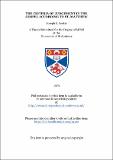Files in this item
The criteria of judgement in the Gospel according to St. Matthew
Item metadata
| dc.contributor.author | Leckie, Joseph Logan | |
| dc.coverage.spatial | xiv, 372 p. | en_US |
| dc.date.accessioned | 2018-06-15T13:25:00Z | |
| dc.date.available | 2018-06-15T13:25:00Z | |
| dc.date.issued | 1979-10 | |
| dc.identifier.uri | https://hdl.handle.net/10023/14122 | |
| dc.description.abstract | An introduction gives weight to the contention that the topic has been neglected. Chap. 1 fixes the date of writing between A.D. 90 - 100. Provenance in Tyre or Sidon seems likely. No firm conclusion is reached regarding authorship, but the two-editor hypothesis, is favoured as is the idea of a School of Matthew. Some points of similarity are found between Matthew and other writings of about his period. It is considered a strong possibility that Matthew carried on a polemic against the Jewish community at Jamnia. Chap. 2 deals with the criteria of judgement emerging from the Sermon on the Mount: savourless salt, an absence of the inner resources which produce good works; lack of the righteousness which exceeds that of the scribes and Pharisees; anger and abusive and condemnatory speech; adultery in the heart; divorce; lack of forgiveness to a brother; the parsimonious eye with the possibility of duplicity; censoriousness; the wide gate and the broad a likely meaning of which is lack of repentance; false disciples and false prophets whose verbal affirmations and even wonderful works are not matched by their conduct; disobedience to Jesus' teaching. In Chap. 5 attention is directed to disbelief in and rejection of Jesus and his mighty works which culminate in the unforgivable sin. This is closely associated with and virtually equivalent to rejecting his disciples (this matter recurs in chap. 4). Autonomous religion is condemned (15.13, 14; 23 passim). Rejection of the King's invitation also figures and the meaning of the wedding garment in 22.11-14 is considered. Hypocrisy and its ramifications are dealt with. Want of vigilance, some of it a sort of bland unawareness, some of it resulting in ungodly, profligate, cruel and tyrannous behaviour also appears. Lack of watchfulness reappears in chap. 4 with emphasis on sham religion. Considerable space is given to the meaning, if any, of the oil (25.1-13). Next cones failure to use one's spiritual gift and finally, lack of charity in the most elementary form to those who are, it is held, Jesus' lowliest disciples. A conclusion attempts to show that wrong attitude is all-embracing and that rejection of Jesus and/or his disciples is the next most significant criterion of judgement with lack of repentance ranking almost equally. Twelve appendices attempt to give background to some material which vas only adumbrated in the text or treated less fully than it deserved owing to limitations of space. | en_US |
| dc.language.iso | en | en_US |
| dc.publisher | University of St Andrews | |
| dc.subject.lcc | BS2576.L3 | en |
| dc.subject.lcsh | Bible. Matthew--Criticism, interpretation, etc | en |
| dc.subject.lcsh | Judgment--Biblical teaching | en |
| dc.title | The criteria of judgement in the Gospel according to St. Matthew | en_US |
| dc.type | Thesis | en_US |
| dc.type.qualificationlevel | Masters | en_US |
| dc.type.qualificationname | MPhil Master of Philosophy | en_US |
| dc.publisher.institution | The University of St Andrews | en_US |
This item appears in the following Collection(s)
Items in the St Andrews Research Repository are protected by copyright, with all rights reserved, unless otherwise indicated.

